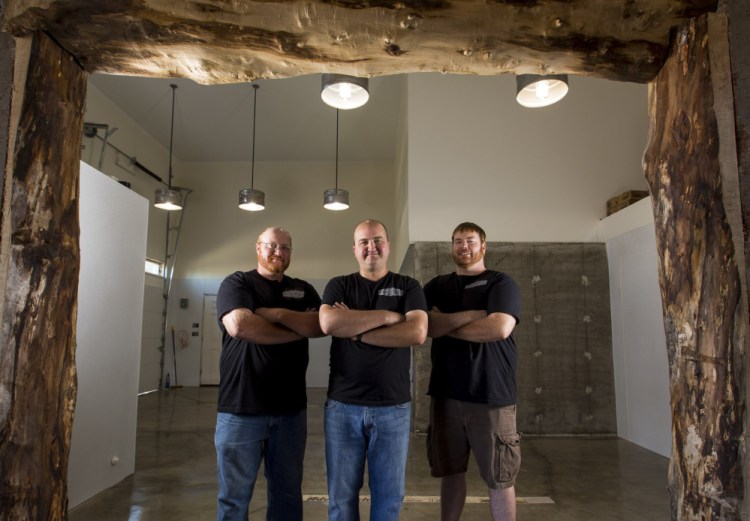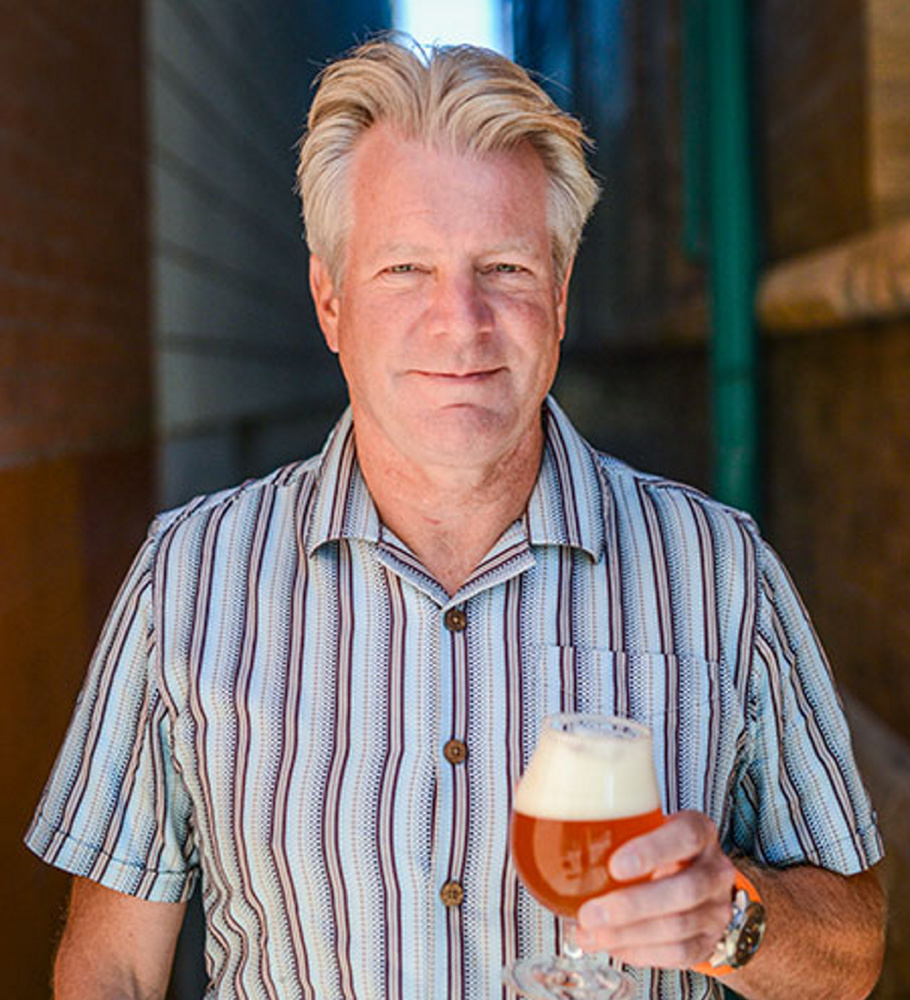SOUTH PORTLAND — John LeGassey’s eyes bulged when he was asked if he’d heard of Dick Cantwell, then he nodded in the affirmative. Yes, of course.
The co-founder of Seattle’s Elysian Brewing Co. is well-known in the beer world for two reasons: He has made award-winning beer for decades, and he famously left the company he co-founded after his two partners agreed to sell to Anheuser-Busch in 2014.
Cantwell will be at the University of Southern Maine’s Portland campus April 1 as the keynote speaker at the New England Craft Brew Summit. The event, which aims to help the region’s booming craft beer industry, consists of a series of workshops for brewery owners and workers.
Cantwell serves as the national Brewers Association’s quality ambassador. He travels the country to get brewers to focus on quality and consistency in their batches.
And LeGassey, co-founder of South Portland’s Fore River Brewing Co., is ready to soak up Cantwell’s advice. A recent experience underscores his interest.
He and brewing partner T.J. Hansen started brewing beer commercially in December and opened for business in January. Early on, they were using a $16 stainless steel dryer vent from Lowe’s to vent their boiler while they waited to get one custom-fabricated.
When they heated the beer up to a boil, the vent couldn’t expel enough heat, which meant multiple batches boiled over. Despite controlling all the variables and doing all their due diligence to make sure the brewing process was seamless, a $16 vent failed them.
“If we didn’t watch that kettle like a hawk, it would boil over and it would shoot hot wort out the window and into the yard,” LeGassey said. “It’s terrible. You’d look out the window and just see a stream of money flying out.”
LeGassey expects to attend the summit with notepad in hand.
“(Cantwell’s) got a wealth of stories and experiences. We’ll eat it right up,” LeGassey said.
QUALITY CONTROL CHALLENGES
Cantwell, who still lives part time in Seattle, has stayed busy since leaving Elysian in the spring of 2015. He has co-authored a book about barrel-aging beers with New Belgium’s Peter Bouckaert, but spends most of his time urging new brewers to pay attention to the quality and consistency of their beer.
“It’s all over the map,” Cantwell said. “That’s why I’m taking this message out on the road. There are 4,200 breweries in the country and most of them are less than a few years old.”
That’s the problem, Cantwell said. Instead of working in the industry for years before starting their own breweries, home brewers are diving in headfirst with no commercial experience.
“While we all applaud the spirit of entrepreneurship, there are a couple of disconnects in there,” he said. “One is partly in terms of culture, but also in terms of execution. People haven’t been provided that sort of on-the-job education along the way.”
Instead, they learn on the job and suffer through experiences like Fore River’s projectile wort.
Their problems are hardly unique. Foundation Brewing Co. didn’t release any of its beer the week of St. Patrick’s Day after a technical problem ruined that week’s batches.
Craft beer fans don’t seem to mind when a brewery holds back beer to protect its reputation, said Foundation Brewing co-owner Joel Mahaffey.
“We had a good reaction to the news,” he said. “A lot of people appreciated hearing we were willing to hold back a batch of beer to hold our beer at a level of quality we expect it to be at.”
Delaware’s Dogfish Head Brewery, which distributes nationally, famously dumped a batch of its 120 Minute IPA down the drain in 2010 after a strain of yeast was introduced that changed the flavor of the beer. The incident was captured on an episode of “Brew Masters,” a short-lived reality show that followed Dogfish Head co-owner Sam Calagione. He said the incident cost his brewery about $500,000 in materials and time.
TAKEOVERS BY CORPORATE BREWERS
The vast majority of Maine’s breweries aren’t nearly on the scale of Dogfish Head, but quality control is a universal issue.
Cantwell dealt with it all at three different breweries in Seattle before he started Elysian. When his partners agreed to sell to Anheuser-Busch, Cantwell vehemently opposed the deal and left a few months after the sale was completed.
That also will be part of his message at the beer summit. Local breweries are going to grow, and eventually ownership will look to retire or get out of the industry. What can be done to prevent an Anheuser-Busch takeover?
“We can’t necessarily prevent it. There are going to be buyouts. That’s becoming not just a million-dollar question, that’s a billion-dollar question,” Cantwell said, referencing the recent ownership stake that California’s Lagunitas Brewing sold to Heineken.
“How do we keep (sales to Anheuser-Busch) from happening? That’s part of my message in the quality talks,” Cantwell said. “I recognize the pressure of succession. What do you do with this business you’ve taken pride in? How are you going to get out? I do try to appeal to people to maintain their sense of community. I urge them to stay true to themselves and continue to work together.”
Foundation Brewing’s Mahaffey says beer industry consolidation is a practical concern for small brewers. Large brewers could tie up the supply chain, Mahaffey said, capturing available hops or grains and preventing smaller breweries from getting their necessary ingredients.
To be sure, Maine’s brewers want to get bigger. But the goal isn’t to sell beer in 50 states.
“There’s a lot of people when we first opened that would ask, ‘In 10 years, are you going to be the new Sam Adams and be all over the country?’ I really don’t think there’s room in the market for that type of growth any more,” Mahaffey said. “What you can do is be really strong in your local market, because you’d better believe that in the next five years, there’s going to be excellent breweries in the regions of the country that have an interest in craft beer. And that’s OK. You’re getting fresh, local, excellent beer.”
THE ATTRACTION OF INDEPENDENCE
Would Maine’s brewers ever sell to Anheuser-Busch or Heineken? That remains to be seen, but LeGassey says the state’s brewers have a built-in reason not to sell. Although many new brewers don’t have the industry experience Cantwell prizes, they have spent time in corporate cubicles with tiers upon tiers of bosses. Sell to a corporation? Probably never.
“Suddenly you go from being an owner with creative control over that brand to accountable to some regional sales executive – I just can’t imagine that,” LeGassey said. “I don’t think that’s something we have any interest in.”
Send questions/comments to the editors.




Success. Please wait for the page to reload. If the page does not reload within 5 seconds, please refresh the page.
Enter your email and password to access comments.
Hi, to comment on stories you must . This profile is in addition to your subscription and website login.
Already have a commenting profile? .
Invalid username/password.
Please check your email to confirm and complete your registration.
Only subscribers are eligible to post comments. Please subscribe or login first for digital access. Here’s why.
Use the form below to reset your password. When you've submitted your account email, we will send an email with a reset code.